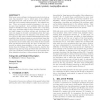Free Online Productivity Tools
i2Speak
i2Symbol
i2OCR
iTex2Img
iWeb2Print
iWeb2Shot
i2Type
iPdf2Split
iPdf2Merge
i2Bopomofo
i2Arabic
i2Style
i2Image
i2PDF
iLatex2Rtf
Sci2ools
121
click to vote
ECLIPSE
2005
ACM
2005
ACM
Coping with an open bug repository
Most open source software development projects include an open bug repository—one to which users of the software can gain full access—that is used to report and track problems with, and potential enhancements to, the software system. There are several potential advantages to the use of an open bug repository: more problems with the system might be identified because of the relative ease of reporting bugs, more problems might be fixed because more developers might engage in problem solving, and developers and users can engage in focused conversations about the bugs, allowing users input into the direction of the system. However, there are also some potential disadvantages such as the possibility that developers must process irrelevant bugs that reduce their productivity. Despite the rise in use of open bug repositories, there is little data about what is stored inside these repositories and how they are used. In this paper, we provide an initial characterization of two open bug r...
Related Content
| Added | 14 Oct 2010 |
| Updated | 14 Oct 2010 |
| Type | Conference |
| Year | 2005 |
| Where | ECLIPSE |
| Authors | John Anvik, Lyndon Hiew, Gail C. Murphy |
Comments (0)

